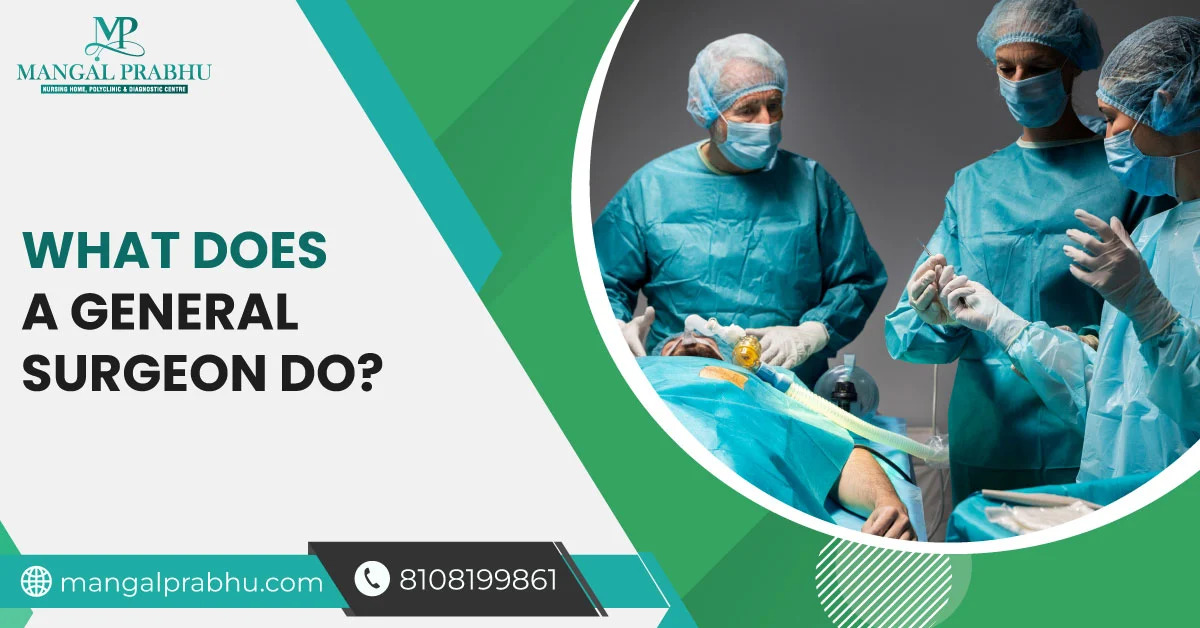
What Does a General Surgeon Do?
A general surgeon is a certified and licensed healthcare specialist who performs a wide range of surgical procedures. They are different from surgeons specializing in certain fields, like cardiologists (heart specialists), neurologists (brain surgeons), and oncologists (surgeons of cancer). These surgeons perform operations on the abdomen, gastrointestinal tract, musculoskeletal system, and other general body parts. So, when exactly do you need to see a general surgeon in Navi Mumbai, and what’s their role? Let’s find out.
The Role of a General Surgeon
A general surgeon is a specialist in many physical conditions that may or may not require surgical intervention. If they believe the condition is too complicated to be treated, they will refer you to a specialist for the particular disease. Here’s what they do:
a) Surgical Procedures Performed
An experienced surgeon can perform surgical procedures for a medical condition or a cosmetic purpose. They might choose open surgery or perform a laparoscopic procedure, which involves small instruments that give a clear picture of your internal organs. In addition, some general surgeons have embraced robot-assisted surgical procedures to ensure maximum precision and the best outcome with minimal risk of post-surgical complications.
b) Pre and Post-Operative Care
Post-operative care involves the follow-up treatment after a surgical procedure. The level of post-op care a patient needs depends on the type of surgery and their health status. A general surgeon will give detailed instructions regarding what to eat, avoid, and how to take care of the wound. They will also ask you to schedule follow-up appointments for post-operative care.
c) Patient Education and Counseling
You might see a general surgeon for a chronic disease, a severe illness, or a sudden accident. Based on your symptoms and health, they will recommend the most suitable medical treatment. Patient counseling is part of their job. They discuss the available treatment options and determine the most reliable plan that fits your condition.
Common Surgical Procedures Performed by General Surgeons
A general surgeon can perform a vast array of surgical procedures, including:
i) Appendectomy:
A surgery to remove an inflamed appendix. It’s an emergency medical condition that requires immediate removal of the appendix to save the patient’s life. The surgeon can perform it laparoscopically or choose an open surgery.
ii) Breast Surgery:
A general surgeon specializes in breast augmentation, reconstruction, reduction, removal, and lumpectomy. Breast surgery can be a part of a cancer treatment or a cosmetic procedure.
iii) Colorectal Surgery:
Colorectal surgery involves the treatment of your large intestine, i.e., rectum, anus, and colon. A general surgeon might perform a colorectal surgery if you are diagnosed with cancer of the colon and other parts of your large intestine, have polyps, or have inflammatory bowel disease.
iv) Hernia Repair:
A surgery hospital in Navi Mumbai has a general surgeon who can treat nearly all types of hernia. The surgery helps push the bulging hernia back into its original place and involves placing a mesh material that strengthens the weakened tissues.
From removing small skin lesions to performing surgery on the internal organs, a general surgeon does it all.

Symptoms Of Hernia In Male
I. Introduction
This condition can develop in various parts of the body, but it commonly occurs in the abdomen or groin area. According to Mangal Prabhu Hospital, recognizing the symptoms of hernia in males is crucial for several reasons. Firstly, timely identification allows for prompt medical intervention, which can prevent complications and alleviate discomfort.
Hernia occurs when an organ or fatty tissue protrudes through a weak spot or tear in the surrounding muscle or connective tissue. Additionally, untreated hernias can lead to more serious complications, making early detection essential for optimal outcomes. Here, you can delve into the various symptoms of hernia in males.
II. Common Symptoms of Hernia in Males
i) Bulge or swelling in the groin or scrotum:
One of the most prominent signs of a hernia in males is a visible bulge or swelling in the groin or scrotum area. This bulge may become more noticeable when standing, coughing, or straining.
ii) Pain or discomfort in the affected area:
Hernias can cause varying degrees of pain or discomfort, ranging from mild to severe. This discomfort may worsen with physical activity or prolonged periods of standing.
iii) Heaviness or pressure sensation:
Some individuals with hernias may experience a sensation of heaviness or pressure in the affected area, particularly during physical exertion or lifting heavy objects.
iv) Difficulty or pain during physical activities:
Engaging in physical activities such as lifting, bending, or exercising may exacerbate hernia symptoms, leading to increased discomfort or pain.
III. Less Common Symptoms of Hernia in Males
While the aforementioned symptoms are more prevalent, hernias can also manifest through less common signs, including:
a) Nausea or vomiting:
In some cases, hernias may cause nausea or vomiting, especially if the protruding organ or tissue becomes obstructed.
b) Changes in bowel movements:
Hernias affecting the abdominal region can sometimes lead to changes in bowel movements, such as constipation or difficulty passing stool.
c) Urinary difficulties:
Inguinal hernias, which occur in the groin area, may cause urinary difficulties such as frequent urination or difficulty emptying the bladder.
IV. When to Seek Medical Attention
If you experience any of the symptoms mentioned above, it’s crucial to consult a healthcare professional like Hernia Surgeon in Navi Mumbai promptly. Delaying medical evaluation and treatment can increase the risk of complications associated with hernias, such as strangulation or obstruction of the protruding tissue.
V. Treatment Options
- Surgical interventions: Repairing weakened muscles or tissues through surgical procedures.
- Non-surgical approaches: Utilizing methods like wearing supportive garments or trusses.
- Lifestyle modifications for prevention: Implementing habits such as proper lifting techniques and maintaining a healthy weight to reduce the risk of hernia development.
VI. Conclusion
Recognizing the symptoms of hernia in males is essential for early diagnosis and prompt intervention. By being aware of the common signs and seeking timely medical attention, individuals can effectively manage hernias and minimize the risk of complications.
If you’re experiencing any symptoms suggestive of a hernia, don’t hesitate to contact Mangal Prabhu Hospital for expert evaluation and hernia treatment in Navi Mumbai. Your health and well-being are our top priorities.
